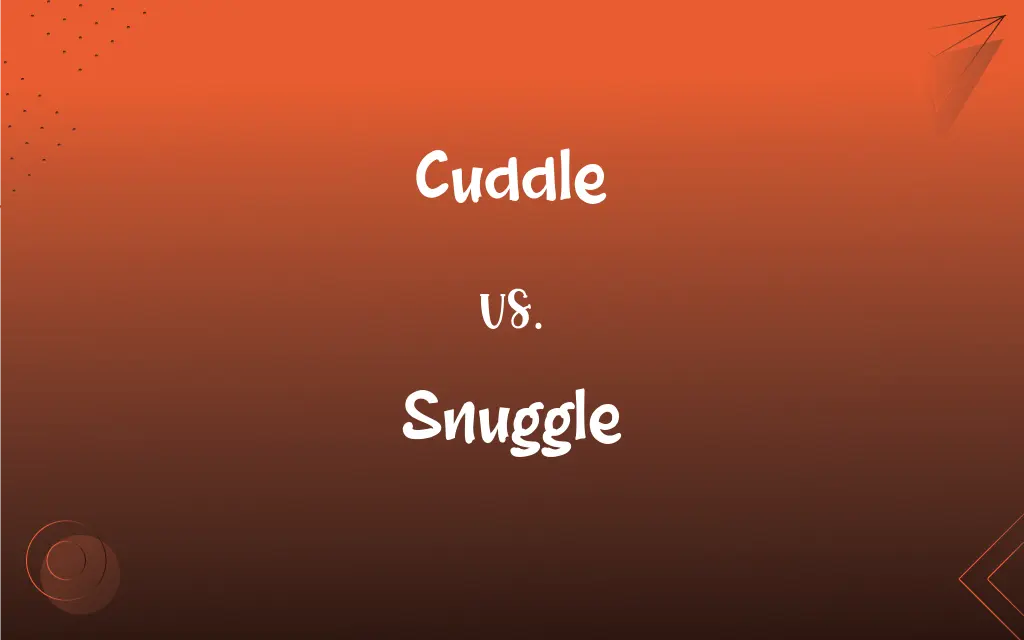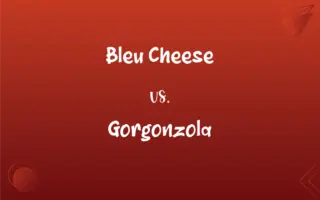Cuddle vs. Snuggle: What's the Difference?
Edited by Aimie Carlson || By Harlon Moss || Updated on October 2, 2023
Cuddle implies holding close for warmth or comfort, while snuggle suggests nestling or burrowing for coziness.

Key Differences
Cuddle and snuggle, while largely synonymous, do possess subtle nuances; cuddle often portrays a slightly more protective or nurturing embrace, while snuggle may convey a seeking of comfort, possibly a more mutual or reciprocal action.
In the domain of cuddling, the imagery evoked might lean towards a gentle holding or enveloping, often with a connotation of providing comfort or assurance, whereas a snuggle often brings forth images of drawing oneself close to another entity, often for warmth or a shared closeness.
A cuddle often can have a nurturing or safeguarding undertone, perhaps seen in a parent cuddling a child, radiating a sense of providing shelter or security; in contrast, a snuggle often might be pictured as two entities seeking mutual warmth or affection, such as two lovers.
Notably, to cuddle can often stand as a more generalized term and might be used in a range of contexts from casual to intimate; however, to snuggle might be often viewed as intimate, cozy, and possibly more reciprocal, involving a shared exchange of warmth and affection.
It’s essential to recognize that while these differences do exist, in many contexts, especially colloquially, cuddle and snuggle might be used interchangeably, owing to their close semantic proximity and the shared essence of close physical contact they both denote.
ADVERTISEMENT
Comparison Chart
Connotation
Nurturing, protective
Cozy, mutual
Typical Use
General, can range from casual to intimate
More often intimate or cozy
Implied Interaction
May imply a caretaker and receiver dynamic
Suggests reciprocal or shared closeness
Emotional Undertone
Can suggest comfort or solace
Might imply seeking shared warmth
Common Imagery
Enveloping or holding close
Nestling or burrowing into
ADVERTISEMENT
Cuddle and Snuggle Definitions
Cuddle
To hold someone close to provide comfort.
After the nightmare, she wanted a cuddle from her mother.
Snuggle
A mutual, warm, and cozy physical closeness.
As the fireplace flickered, they enjoyed a sweet snuggle.
Cuddle
Physical closeness typically providing warmth or comfort.
The cold weather made them cuddle under the blanket.
Snuggle
Moving into a cozy and close position.
She decided to snuggle into the soft, warm blankets.
Cuddle
A gentle and comforting physical embrace.
After the scary movie, a reassuring cuddle was needed.
Snuggle
To lie or press closely, often intimately.
The couple would snuggle under the starry night sky.
Cuddle
An embrace often to convey affection or solace.
The small puppy sought a cuddle from its owner.
Snuggle
To nestle close, especially for warmth or affection.
The kittens began to snuggle against their mother.
Cuddle
Holding someone close, often in a protective manner.
He gave her a cuddle to shield her from the chilly wind.
Snuggle
Seeking closeness typically for shared comfort.
During the movie, they chose to snuggle on the couch.
Cuddle
To hold fondly in the arms; hug tenderly.
Snuggle
To lie or press close together; cuddle.
Cuddle
To nestle; snuggle
The children cuddled together on the couch.
Snuggle
To curl up closely or comfortably; nestle
Snuggled happily under the covers.
Cuddle
The act of cuddling; a hug or embrace.
Snuggle
To draw close or hold closely, as for comfort or in affection; hug.
Cuddle
A snuggle; an affectionate embrace, often given to family members and close friends.
Give me a cuddle, Paul, it'll cheer you up.
Snuggle
An affectionate hug.
Let's have a snuggle on the sofa.
Cuddle
(intransitive) To embrace affectionately; to lie together snugly.
The young lovers cuddled on the couch.
Snuggle
The final remnant left in a liquor bottle.
Cuddle
(transitive) To cradle in one's arms so as to give comfort, warmth.
She cuddled the infant before bedtime.
I'm cold; can you roll over here and cuddle me, honey?
Snuggle
To lie close to another person or thing, hugging or being cosy.
Sometimes my girlfriend and I snuggle.
The surrounding buildings snuggled each other.
The last drop of jager snuggled the corner of the pint.
Cuddle
To lie close or snug; to crouch; to nestle.
Snuggle
To move or arrange oneself in a comfortable and cosy position.
Tired but satisfied, the children snuggled into their sleeping bags.
The pet dog snuggles into its new bed.
Cuddle
To lie close or snug; to crouch; to nestle.
She cuddles low beneath the brake;Nor would she stay, nor dares she fly.
Snuggle
To move one way and the other so as to get a close place; to lie close for comfort; to cuddle; to nestle.
Cuddle
To embrace closely; to fondle.
Snuggle
A close and affectionate (and often prolonged) embrace
Cuddle
A close embrace.
Snuggle
Move or arrange oneself in a comfortable and cozy position;
We cuddled against each other to keep warm
The children snuggled into their sleeping bags
Cuddle
A close and affectionate (and often prolonged) embrace
Snuggle
Position comfortably;
The baby nestled her head in her mother's elbow
Cuddle
Move or arrange oneself in a comfortable and cozy position;
We cuddled against each other to keep warm
The children snuggled into their sleeping bags
Cuddle
Hold (a person or thing) close, as for affection, comfort, or warmth;
I cuddled the baby
FAQs
What does "cuddle" mean?
"Cuddle" means to hold someone close in an affectionate manner.
Can "cuddle" be used as a noun?
Yes, "cuddle" can be a noun, referring to an act of cuddling.
What is the origin of "cuddle"?
"Cuddle" originates from the early 16th century, possibly of Germanic origin.
Is "cuddle" a formal or informal term?
It is considered an informal term.
Can "cuddle" be used in various contexts?
Yes, it can describe physical closeness between friends, family, couples, or even with pets.
What are synonyms for "cuddle"?
Hug, embrace, and snuggle are synonyms.
Can "snuggle" indicate physical positioning?
Yes, it can refer to nestling or positioning oneself cozily.
Does "snuggle" convey a sense of safety or comfort?
Typically, yes. It often implies a sense of warmth, comfort, and/or security.
What's an example of "cuddle" in a sentence?
"They sat on the sofa to cuddle and watch a movie."
Does "cuddle" imply a level of emotional comfort?
Yes, it typically implies affection, warmth, and comfort.
Is "cuddle" used in any idioms or expressions?
There aren't many idioms, but "cuddle up" is a phrasal verb related to it.
What are synonyms for "snuggle"?
Nestle, cuddle, and cozy up are synonyms.
What’s the origin of "snuggle"?
It's believed to be of Low German origin, originating in the late 16th to early 17th century.
What does "snuggle" mean?
"Snuggle" means to settle oneself comfortably and cozily, often involving close contact with another person or a soft item.
What differentiates "snuggle" from similar words?
"Snuggle" often implies a cozy, comforting aspect and may not always involve as close contact as cuddle.
How can "snuggle" be used in various contexts?
It can be used romantically, comfortingly, or even casually, like snuggling in a warm blanket.
Is "cuddle" a transitive or intransitive verb?
It can be both, e.g., "She cuddled the baby" (transitive) or "They cuddled together" (intransitive).
Is "snuggle" a verb or a noun?
"Snuggle" can be used as both a verb and a noun.
What is an example of "snuggle" in a sentence?
"The puppy found a spot to snuggle beside her."
Can "snuggle" refer to non-human entities?
Yes, animals can snuggle, and one can snuggle with objects like blankets.
About Author
Written by
Harlon MossHarlon is a seasoned quality moderator and accomplished content writer for Difference Wiki. An alumnus of the prestigious University of California, he earned his degree in Computer Science. Leveraging his academic background, Harlon brings a meticulous and informed perspective to his work, ensuring content accuracy and excellence.
Edited by
Aimie CarlsonAimie Carlson, holding a master's degree in English literature, is a fervent English language enthusiast. She lends her writing talents to Difference Wiki, a prominent website that specializes in comparisons, offering readers insightful analyses that both captivate and inform.






























































